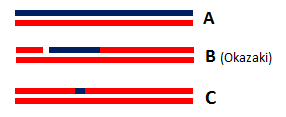We apologize for Proteopedia being slow to respond. For the past two years, a new implementation of Proteopedia has been being built. Soon, it will replace this 18-year old system. All existing content will be moved to the new system at a date that will be announced here.
Sandbox Reserved 967
From Proteopedia
(Difference between revisions)
| Line 25: | Line 25: | ||
The first domain structure of the complex, H2A, contains 301 amino acids, almost as H2B protein which computes 308 amino acids. H2C protein is the smallest subunit: it only has 166 amino acids. | The first domain structure of the complex, H2A, contains 301 amino acids, almost as H2B protein which computes 308 amino acids. H2C protein is the smallest subunit: it only has 166 amino acids. | ||
Each of these proteins adopts various secondary structures with β-strands and α-helices: | Each of these proteins adopts various secondary structures with β-strands and α-helices: | ||
| - | + | H2A protein has 12 α-helices, 11 β-strands and 3 turns<ref> http://www.uniprot.org/uniprot/Q9CWY8</ref>, | |
| - | + | H2B molecule computes 8 α-helices, 7 β-strands and 3 turns<ref> http://www.uniprot.org/uniprot/Q80ZV0</ref>, | |
| - | + | H2C subunit consists of 5 α-helices, 8 β-strands and 2 turns<ref> http://www.uniprot.org/uniprot/Q9CQ18</ref>. | |
| Line 62: | Line 62: | ||
== References == | == References == | ||
<references/> | <references/> | ||
| + | |||
| + | == Proteopedia page contributors and editors == | ||
| + | |||
| + | Anaïs Bourbigot & Valériane Keïta | ||
Revision as of 19:09, 9 January 2015
| This Sandbox is Reserved from 15/11/2014, through 15/05/2015 for use in the course "Biomolecule" taught by Bruno Kieffer at the Strasbourg University. This reservation includes Sandbox Reserved 951 through Sandbox Reserved 975. |
To get started:
More help: Help:Editing |
Structure of the Mouse RNase H2 Complex
| |||||||||||
References
- ↑ http://genome-euro.ucsc.edu/cgi-bin/hgTracks?clade=mammal&org=Mouse&db=mm10&position=RnaseH2&hgt.positionInput=RnaseH2&hgt.suggestTrack=knownGene&Submit=submit&hgsid=201143152_yP1Xd4bMnHS7DV0d3VcqpDSxzzuQ&pix=1563
- ↑ Rychlik, Monika P., Hyongi Chon, Susana M. Cerritelli, Paulina Klimek, Robert J. Crouch, and Marcin Nowotny. “Crystal Structures of RNase H2 in Complex with Nucleic Acid Reveal the Mechanism of RNA-DNA Junction Recognition and Cleavage.” Molecular Cell 40, no. 4 (November 24, 2010): 658–70. doi:10.1016/j.molcel.2010.11.001.
- ↑ Sparks, Justin L., Hyongi Chon, Susana M. Cerritelli, Thomas A. Kunkel, Erik Johansson, Robert J. Crouch, and Peter M. Burgers. “RNase H2-Initiated Ribonucleotide Excision Repair.” Molecular Cell 47, no. 6 (September 28, 2012): 980–86. doi:10.1016/j.molcel.2012.06.035.
- ↑ 4.0 4.1 4.2 Bubeck, Doryen, Martin A. M. Reijns, Stephen C. Graham, Katy R. Astell, E. Yvonne Jones, and Andrew P. Jackson. “PCNA Directs Type 2 RNase H Activity on DNA Replication and Repair Substrates.” Nucleic Acids Research 39, no. 9 (May 2011): 3652–66. doi:10.1093/nar/gkq980.
- ↑ 5.0 5.1 Shaban, Nadine M., Scott Harvey, Fred W. Perrino, and Thomas Hollis. “The Structure of the Mammalian RNase H2 Complex Provides Insight into RNA•DNA Hybrid Processing to Prevent Immune Dysfunction.” Journal of Biological Chemistry 285, no. 6 (February 5, 2010): 3617–24. doi:10.1074/jbc.M109.059048.
- ↑ http://www.uniprot.org/uniprot/Q9CWY8
- ↑ http://www.uniprot.org/uniprot/Q80ZV0
- ↑ http://www.uniprot.org/uniprot/Q9CQ18
- ↑ Nicholson, Allen W. Ribonucleases. Springer Science & Business Media, 2011.
Proteopedia page contributors and editors
Anaïs Bourbigot & Valériane Keïta

